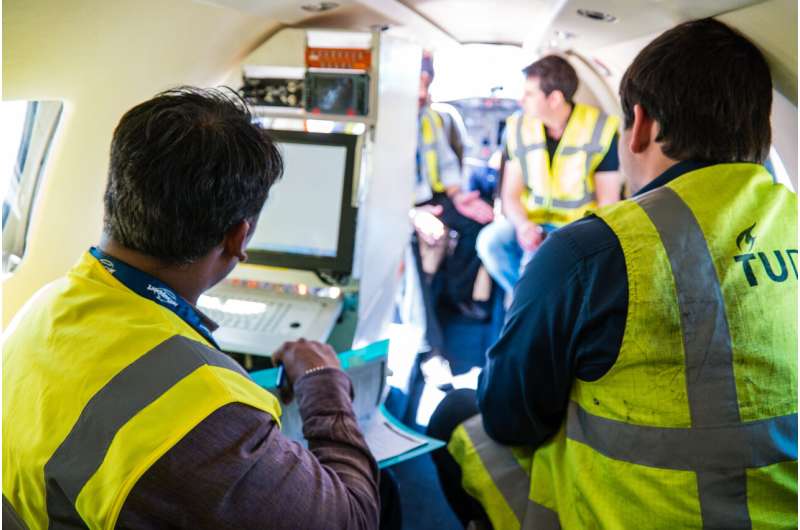Space-enabled system to digitalize airspace goes global

A space-enabled system to help clear congested skies while reducing carbon emissions is going global, following a deal signed today between satellite communications provider Inmarsat and ESA.
Passengers will experience fewer delays once the Iris system is fully implemented—and airlines will save fuel and reduce emissions of carbon dioxide. It could even be used to safely coordinate the flights of drones delivering medical supplies between hospitals or aid to remote communities.
Air travel is increasing and is expected to return to pre-pandemic levels within the next few years. It is predicted to continue to rise thereafter, which will further increase congestion in the skies, while airlines find ways to become more carbon neutral.
At present, pilots mostly communicate with air traffic controllers by voice or by using an outdated data communication technology. This makes flight operations inefficient, as planes have to be kept far apart from one another and follow pre-defined air corridors instead of taking the most direct route.
Data exchanges will soon become the primary means of communication, with large quantities of data relayed to and from the aircraft.
The Iris system uses satellites to relay data digitally from the cockpit to the ground, increasing communication capacity and coverage including remote and oceanic areas. This means that flight plans can be continually updated during the flight to maintain an optimal trajectory towards the destination, minimizing the fuel burned and the carbon dioxide emitted.
Iris has been fully validated within Europe and is due to become operational on commercial flights across Europe at the start of 2023. Today’s agreement means that it is now ready to be assessed and adapted for use in other regions such as Asia and the Americas.
Rajeev Suri, Chief Executive of Inmarsat, said: “Capacity crunches are a major issue worldwide—and relying on existing technologies alone won’t solve the problem. Iris will have an enormous impact in Europe as it enters service in 2023, which is set to continue at pace as air travel increases and the push for more sustainable aviation operations grows.
“It’s a natural next step for us to expand its remit beyond European airspace and share our spoils with the rest of the world. To beat capacity issues and make aviation greener long-term, as well as successfully integrate unmanned aerial vehicles into our airspace as soon as possible, we need the right technologies on board every aircraft—and this starts with Iris.”
Paul Bate, Chief Executive of the U.K. Space Agency, said: “Iris is a real-world example of how space and satellite technologies can bring huge benefits to global industries, making operations more efficient while cutting carbon emissions. There is great potential to catalyze more investment into the space industry by showcasing these benefits, and I’m delighted that Iris was developed in the U.K. by Inmarsat, thanks to the U.K. Space Agency’s investment in commercially focused ESA programs.”
Josef Aschbacher, ESA Director General, said: “Iris is a major step forward towards creating a more sustainable and efficient aviation industry. It is exciting to see the progress we have made so far—but this is only just the beginning.
“Iris Global will extend the benefits of innovation and operational efficiency beyond Europe to other parts of the world. Reaching carbon neutrality for air traffic management by 2050 will be challenging, but we are hope to contribute through innovation in space to achieve this ambitious goal.”
Iris is backed by a consortium of 16 European partners, including the European Satellite Services Provider (ESSP), which is leading the certification effort. The ESSP was founded by seven national air traffic control organizations from France, Germany, Italy, Portugal, Spain, Switzerland and the U.K..
Charlotte Neyret, Chief Executive Officer of the ESSP, said: “The Iris program is a game-changer for the aviation industry, providing the most advanced new technology to complement datalink communications and meet the challenge of digital, greener and more sustainable air travel. As a stepping stone for the future datalink service provider organization under discussion, ESSP is proud to lend its expertise on this important program that will deliver a pan-European certified service for the first time.”
ESA acts to make air travel greener
Citation:
Space-enabled system to digitalize airspace goes global (2022, June 9)
retrieved 9 June 2022
from https://techxplore.com/news/2022-06-space-enabled-digitalize-airspace-global.html
This document is subject to copyright. Apart from any fair dealing for the purpose of private study or research, no
part may be reproduced without the written permission. The content is provided for information purposes only.
For all the latest Technology News Click Here
For the latest news and updates, follow us on Google News.
